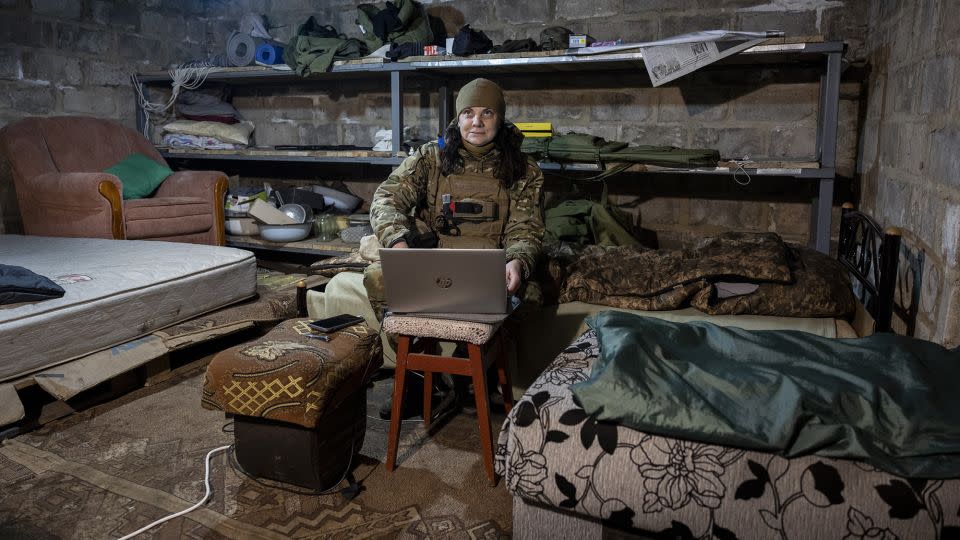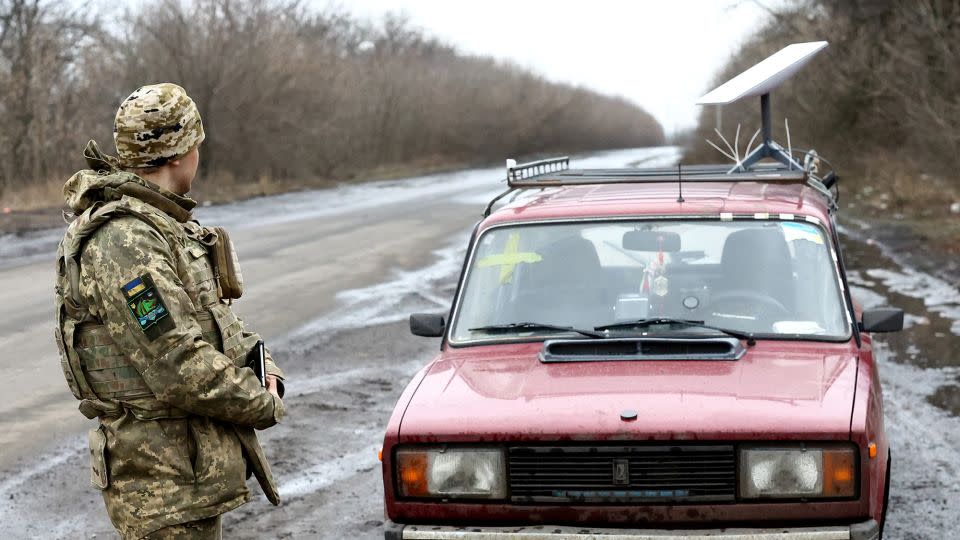Ukraine relies on Starlink for its drone war. Russia appears to be bypassing sanctions to use the devices too
- Oops!Something went wrong.Please try again later.
Ukrainian front-line troops say they are experiencing connection problems with the vital Starlink internet service, owned by Elon Musk and used to run Kyiv’s fleet of attack drones, while also reporting an increase in Russian use of the devices, despite this being prohibited by US sanctions.
In a series of interviews across the front lines, Ukrainian soldiers have said connection speeds have dropped in the past months, and reported other connection problems. The complaints coincide with a rise in Ukrainian sightings of Russian uses of the satellite internet service, run by Musk’s SpaceX, and social media posts in which Russian crowdfunders claim to have successfully bypassed sanctions on Russian use of the devices, buying them in third countries.
The reason for the reports of a deteriorating service in Ukraine are unclear, and Starlink, SpaceX and Musk declined to comment. Yet troops and analysts suggested there may be more Starlinks in contested areas than months earlier, on both sides of the lines, which could impact connection speeds.
The Starlink internet service has provided a significant frontline advantage to Ukraine’s smaller military since the 2022 invasion, permitting its forces to share real-time drone feeds between units, and communicate in areas where combat has disrupted cellphone service.
One communications operator in the Zaporizhzhia area, who asked to be named Misha, told CNN the issues had begun in the past three weeks. “We started noticing (a) bad quality connection,” he said.
“It breaks up all the time, it needs to be rebooted for it to start working properly. But soon the speed starts to decrease and the connection breaks up again. It brings rather unpleasant complications” for their work, he added.
He said adverse weather might be a factor, although CNN has spoken to units across the front lines reporting similar issues.

Another drone operator, a commander of one of the dozens of units flying single-use attack drones at Russian targets, also in the Zaporizhzhia area, said his unit’s issues had begun in January.
“Before New Year the speed was much higher,” said the commander, Anton, from the 65th Mechanised Brigade. “Now it (has) decreased by half. I saw information about the Russians buying Starlinks through the neutral countries and using them on the Zaporizhzhia front line for their purposes.”
He said the same number of Starlink satellites were now serving twice as many units, so “of course the speed dropped down.”
Multiple Ukrainian units across the front lines told CNN they had experienced speed problems with Starlink, and noted Russian use, but declined to be named discussing a sensitive issue.
Ukrainian officials first sounded the alarm about Russian Starlink use in early February, suggesting they were working with SpaceX and Musk to reduce Moscow’s front-line access to the units. Yet they declined to comment for this article, with some experts citing the need to keep the unpredictable businessman on board as a reason for discretion.
“Musk is a big child, so it’s important to talk to him and don’t offend him here because he might make some quick decisions that might not be very good for everyone,” said Oleg Kutkov, a Kyiv-based internet analyst. He said Starlink should be able to restrict access to Russian-held terminals, but their purchase through third countries by Russian crowdfunders might complicate the task.
“The problem is to identify the actual owner of the account. It might be that in one location there are two terminals both (bought) from Poland, and one is working for (the) Ukrainian side and one for the Russian side. And SpaceX just don’t know who they should block,” he said.
In a bid to crack down on Russian Starlink use in occupied areas, Ukraine has sought to impose new legal conditions on satellite communications like Starlink terminals, creating a “whitelist” of registered devices authorised for use by Kyiv. SpaceX, Starlink’s owner, has sought Pentagon advice, according to a person familiar with the matter, on how to deal with the challenge of both satisfying Kyiv’s wishes that Starlink be accessible to Ukrainian forces across all Ukrainian territory, yet also denying Russian forces the service in front-line areas where opposing sides are often so close it is hard to determine the user of each terminal.
The behind-the-scenes diplomacy has been extremely delicate, according to a second source familiar with those discussions. Ukrainian officials for their part have in recent days quietly communicated with both SpaceX representatives and US officials about the importance of implementing the whitelist system of authorized terminals.
Even with the Starlink devices that are firmly in the Ukrainian military’s control, there is a concern among Ukrainian officials that Russians may hijack their communications or hack them. Ukraine’s SBU intelligence service claimed last year that Russian military hackers were trying to steal battlefield communications sent from Ukrainian soldiers’ mobile devices to Starlink terminals.
A Pentagon spokesman, Jeff Jurgensen, referred questions to the Ukrainian government, saying: “While we’re aware of the reporting on this issue, and we’d expect Russia may attempt to leverage any technology that might give them an operational advantage against Ukraine, we have no additional details or information to provide.”
In February, Musk responded to Ukrainian claims the Russians were using Starlink by stating that his company did not do business with the Russian government, and that the system would not work in Russia.
But Starlink was unclear if the technology might work in Russian-occupied areas of Ukraine.
“If SpaceX obtains knowledge that a Starlink terminal is being used by a sanctioned or unauthorized party, we investigate the claim and take actions to deactivate the terminal if confirmed,” the company said then in a statement.

In recent months, Russian social media channels run by crowdfunders have been increasingly open about Starlink purchase s.
One such supplier, posting on the Telegram messaging under the handle Katya Valya, shared a video in which a woman is seen giving two Russian soldiers multiple drones, but also what appeared to be five Starlink terminals. She promised 30 at a later date, and also posted images of a stack of 20 apparent donated Starlink units. Another blogger, CedarWoods, posted images of donated Starlinks and described the damage done to one Russian unit after a “lucky” Ukrainian strike.
Ukrainian units have also been posting footage of multiple drone strikes against Russian trenches where Starlink terminals have been spotted. CNN also obtained a video of a Russian drone feed from the front lines, in which the unit attacks a Ukrainian vehicle, suggesting Moscow has sought to replicate the success of Kyiv’s fleet of cheap, single-use attack drones.
Democrats on the US Congressional Oversight Committee have written to Starlink demanding an urgent briefing on Russian use of the devices, expressing their “grave concern” that Moscow is using the terminals in occupied Ukraine, in contravention of US sanctions.
“We are concerned that you may not have appropriate guardrails and policies in place to ensure your technology is neither acquired directly or indirectly, nor used illegally by Russia,” the committee wrote earlier this month.
CNN’s Sean Lyngaas contributed to this report.
For more CNN news and newsletters create an account at CNN.com

